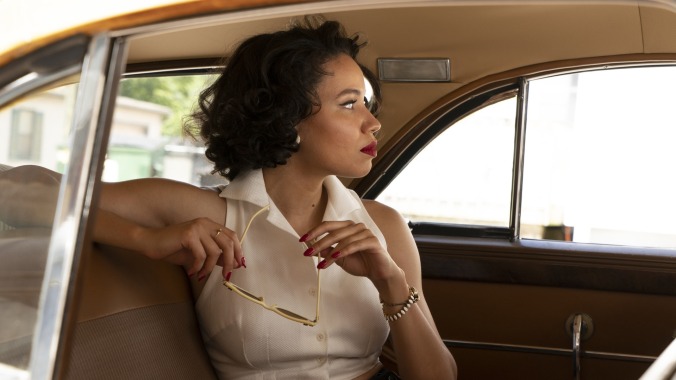Lovecraft Country is a stunning, horrific look at a grotesque legacy

More than 50 minutes into Lovecraft Country’s pilot episode, “Sundown,” Atticus (Jonathan Majors), his childhood friend Letitia (Jurnee Smollett), and his uncle George (Courtney B. Vance) are closely tailed by a bloodthirsty monster on an empty rural road. Bound by frustrating small-town speeding limits, Atticus—affectionately known as “Tic” by his loved ones—can’t risk further triggering their predator by accelerating their getaway car. The stakes are unfairly high as the terrified crew of adventurers eye the county line, which is a makeshift refuge. As this life-or-death chase nears its climatic end, we’re left to wait and see whether or not our protagonists will survive their greatest threat—not a salivating, tentacled beast, but a racist cop with an itch to lynch three Black travelers before the day’s end.
The intense scene is instantly recognizable to those familiar with Matt Ruff’s 2016 novel of the same name, which steeped the horrors of Jim Crow-era racism in magic, pulp horror, and Lovecraftian lore. Ruff’s collection of short stories not only explored anti-Blackness through a terrifying sci-fi lens, but also illustrated the many and varied ways that this brand of trauma is inflicted. Underground co-creator Misha Green not only has a masterful handle on this complex narrative in her adaptation, but also manages to effectively and brilliantly distill very authentic real-world fear into some of the most harrowing imagery in the hybrid genre of sci-fi, horror, and drama. Certain moments are unsettling, chilling, and downright repulsive. It could not be a better representation of navigating a racist America—past and present—as a Black person.
But before viewers even get a glimpse of the series’ first sequence (and god, what an indulgent, fantasy-fueled sequence it is), there’s a knotty legacy to contend with. Of the many things that encompassed American writer H.P. Lovecraft, two elements are especially unerring: He was both an immovable figure in strange pulp fiction literature and an unrepentant white supremacist. His racism could serve as an understandable barrier for those whom his ideology ultimate dehumanized and in lesser hands, it would likely be considered too hearty of a complication to address within the work head-on.
In Lovecraft Country, Tic is a fan of sci-fi and, by proxy, a mouthpiece for how we have come to grapple with the author’s messy legacy. Early in the premiere, he voices his love for the genre and his approach to the difficult figures behind the art: “Stories are like people. The author doesn’t make them perfect, you just try and cherish them, overlook their flaws.” For this particular narrative, it’s not about completely separating the art from the artist, which is an exercise in privilege. But it is a familiar journey for those fans—especially Black fans—who have to constantly negotiate with and make concessions for their abiding interests, some of which don’t quite love them back as readily. Lovecraft Country, thankfully, doesn’t attempt to ignore this difficult task, but ultimately uses it to the story’s advantage by showing an appreciation for Lovecraft’s unparalleled vision while challenging his bigotry with the implementation of Black heroes.
And in this HBO thriller, there is no shortage of heroes and layered figures to celebrate. As a leading man, Majors captures Tic’s kaleidoscope of emotions as a war veteran with an overwhelming birthright in a way that grounds him, even under fantastical circumstances. Tic’s embattled relationship with his father Montrose (Michael K. Williams) could have rendered the latter as a one-denominational villain; however, Williams is a seasoned pro who understands how to balance the many facets of his fictional counterpart’s identity, including race and sexuality (a trope that is rather dated within current narratives, but appropriate for the time in question). But Smollett and Wunmi Mosaku are irrefutable stars in their own right. In Smollett’s fully capable hands, Letitia “Leti” Lewis is a blazing, bat-clutching fighter who is still appropriately terrified and vulnerable. Leti’s sister Ruby, exceptionally portrayed by Mosaku, pilots one of the most horrifying yet relatable episodes of the bunch as she contemplates ultimate access and privilege. Mosaku is unforgettable as she tackles the complicated (and, in this case, really damn gross) struggle between loving oneself and still wishing for a well-earned break from society’s ills. Among her many accomplishments here, Green should absolutely be commended for giving audiences fully realized Black female characters without sacrificing any aspects of their humanity.
To summarize Lovecraft Country as a whole is especially difficult. Yes, there is a through line that involves a secret cabal that underscores the entire series. But what makes this narrative work is its anthological approach to the Black experience. Multiple stories and hypothetical scenarios create a mosaic of horror that keeps the premise fresh and newly terrifying. It’s a fitting format: It’s never just one issue that plagues the Black community’s ability to exist peacefully, because racism doesn’t solely present itself in the form of Klan hoods and burning crosses (though there are instances of the latter, as well). It also comes in the form of job discrimination, basic access to decent housing, police overreach, and small country towns that convert into literal death traps for anyone with brown skin. While that reality is certainly heavy, the audience benefits with imagery that is easy enough for everyone to process—that is, grisly monsters (a visual joy, if you manage to not frightfully look away), thrilling car chases, and soul-arresting ghosts. Lovecraft Country is an utterly imaginative, wild ride, but it isn’t nearly as wild as the nonsensical bigotry that makes the series necessary.
Recaps by Joelle Monique will run weekly beginning August 16.